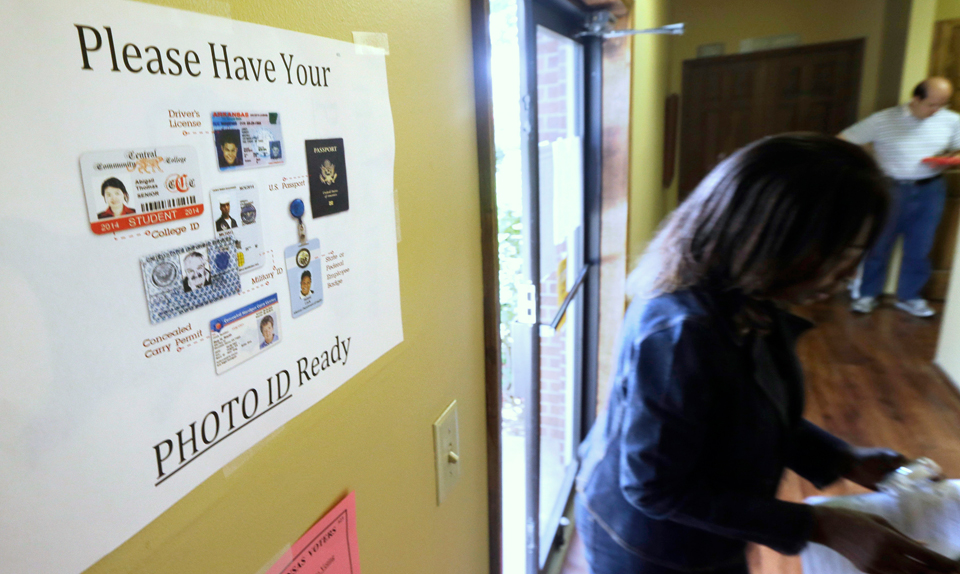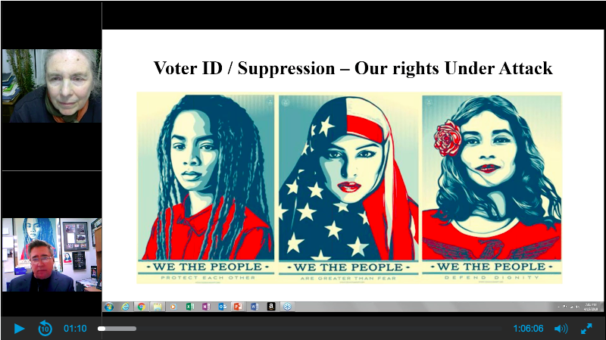
Voter suppression deliberately targets minorities, notably Latinos and Latinas and African Americans, a top official with the League of United Latin American Citizens (LULAC) says—and progressives need to invent a variety of ways to combat it.
In an extended presentation, Joe Henry, the Iowa-based Midwest regional vice president for LULAC, said the aim of interests pushing voter suppression is to eliminate electoral opposition to their corporate and often racist program.
“This modern day ‘poll tax’ is a racist effort to prevent African-American and Latino voters from exercising their democratic rights and casting their ballots. It is unacceptable and a way of stealing elections,” said Joelle Fishman, chair of the Political Action Commission of the Communist Party (CPUSA) who participated in the April 15 webinar. The event was one of a series of Marxist Classes presented by the party’s Education Department.
Vote suppressors use a variety of methods to do so, including strict voter ID laws, moving polling places out of Latino/Latina and African-American neighborhoods, enacting barriers to voters who need the IDs that poll judges now require under those laws (such as drivers’ licenses), and voter misdirection and intimidation. There are 99 voter ID bills introduced in 31 states, Henry said.
“Seven percent of all Americans do not have documents readily available to prove their citizenship,” and thus can be denied the right to vote in advance, turned away at the polls, or both, he added.
Other methods include quick voter “purges” of people who do not participate in, say, two prior elections, he noted. A Supreme Court case from Cleveland, filed by a progressive community group and the AFL-CIO’s A. Philip Randolph Institute, challenges Ohio’s purge law.
“There are also little ways” the right wing can repress voters, said Emile Schepers, another seminar participant active in Virginia politics. He gave as an example from his state the practice of locating polling places to discourage people, particularly “the old, the sick, or those with kids,” by forcing them to wait long times to vote.
In another example, Iowa’s GOP Secretary of State is trying the same quick purge there, Henry said. It too faces a court challenge. Meanwhile, the Hawkeye State has become more diverse, worrying the right wing: From 1980-2010, Henry said, Iowa’s African-American percentage doubled and its Asian-American population quintupled. The capital, Des Moines, is now 12 percent Latino and 10 percent African-American, he said.
“Racism is again being used for the purposes of the conservatives,” Henry said.
Besides racial minorities, other voter suppression targets are students, the elderly, women (in blue states), and workers. The point is to eliminate the opposition’s right to vote, Henry said.
The results have shown up in election returns, Henry said. He particularly cited 2016 presidential election returns from African-American precincts in Milwaukee, where turnout dropped by 40,000 people after the GOP-run Wisconsin government jammed through a tough voter ID law. Though the courts put a temporary hold on the measure, there was enough confusion to depress the vote—and enough to give GOP presidential nominee Donald Trump the state.

Henry said progressives must fight back through a combination of measures: Lobbying to overturn voter ID laws and other repressive measures at the state level, electing lawmakers this November who will promise to do so, engaging in direct action on the streets to elevate the issue among all voters, and fighting repressive measures in courts.
“The battles on the legal front can only be won in effect by registering and voting. And we in unions and community coalitions also have to prepare people to defend themselves when challenged” at the polls. “But while the battle is being fought by attorneys, the decisions for it must be made in union halls and among community groups. This is not rocket science.”
“We need to create strong workplace organizations to get people to the polls—and to make sure they have access to the polls once they get there,” Schepers said.
“This has to be fought both in the courts and on the streets,” Fishman agreed. “Voting is the most basic aspect of democracy.”
Henry’s presentation is available at: https://attendee.gotowebinar.com/register/1963133321210097154 (registration required).












Comments